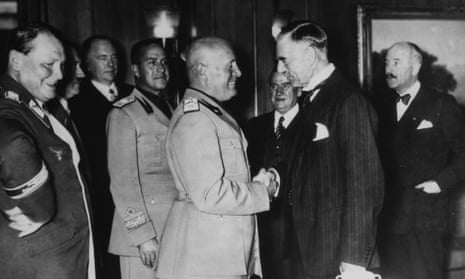Westminster, Monday.
Mr Chamberlain reached to-day the last Parliamentary stage in his journey from Munich to Rome, and the Opposition tried to discover whether he was packing in his trunk any gifts for Mussolini - such gifts, Mr Lloyd George suggested, as friendship with the country whose forces were waging savage warfare on the wives and children of the heroes of the Ebro, as connivance in the sinking of British foodships, and as the refusal to resist the continued intervention of Italy in Spain.
The House had a right to answer, declared Mr Lloyd George. Signor Mussolini announced to his own people what his aims were, and surely the elected representatives of 25,000,000 British people might expect as much confidence from the Prime Minister?
The Premier
Mr Chamberlain, indeed was mainly concerned to defend his policy of appeasement. “If I had to live these eighteen months over again I would not change it by one jot,” he declared. But he did, nevertheless, suggest for the first time that the results of Munich had not been as good as he has expected, and the terms he used in a very important passage of his speech relating to Germany may have been intended as a warning to Italy.
He described the post-war relations between Britain and Germany. The treatment of the German people had been neither “generous nor wise.” We now recognised their great qualities and had a strong desire to see them co-operate in the restoration of European civilisation, for without their help there would be neither peace nor progress in Europe. There was wide agreement in the House with this statement of the position.
“At the same time”, he added with great emphasis, “I must add that it is not enough for us to express that desire. It takes two to make war, and I am still waiting for a sign from those who speak for the German people that they share this desire and that they are prepared to make their contribution to peace which will help them as much as it would help us.”
Britain’s Rearmament
This passage too had general approval, and agreement with Mr Chamberlain grew as he concluded this part of his speech. “To reproach us with rearmament after Munich,” he said, “is strangely to ignore facts which are patent to all. We are ready at any time to discuss the limitation of armaments on the basis that all would contribute to that limitation with due regard to their own safety. So long as others are going on arming day and night we are bound to do the same, for although reason is the finest weapon in the world to combat reason it has little chance to assert itself where force is supreme.”
Mr Chamberlain ended with a warning that it would be “a tragic blunder” to mistake Britain’s love of peace and her faculty for compromise for weakness, and he sang the praises of democracy when roused.
This statement not naturally surprised the Munich worshippers, and it led Mr Alexander to ask whether the Prime Minister also awaited a “sign” from Rome? Mr Chamberlain preferred “to leave the matter as I have stated it,” but in a reference to the Rome visit he showed that he had been stung by critics of his policy.
He regretted extremely the suggestion that Lord Halifax and himself should be required beforehand to be bound not “to betray any cause, abandon any vital principle, or sacrifice any important interest either of this country or of our friends.” Such a suggestion was “not only insulting to us but highly discourteous to our hosts.”
Views on Munich
Mr Chamberlain appears to be a fatalist in foreign affairs. It is all a matter of handshakes or war to him. Thus, for example, he brushed aside Mr Dalton’s criticism of the effect of Munich in Central Europe by saying that the alternative to Munich was war.
Mr Lloyd George ridiculed M Daladier and Mr Chamberlain congratulating each other upon their victory - “Wellington meeting Blucher.” “They both ran away as hard as they could from their obligations, but the Prime Minister, in spite of his more advanced years, kept well ahead,” added Mr Lloyd George.
Neither Sir Archibald Sinclair nor Mr Lloyd George believed that war was the only alternative to “appeasement.” They both saw Munich not in the light of its immediate context but as the inevitable consequence of years of retreat by the Government. Neither was happy to think that the same policy might be followed in Rome.
This is an edited extract, click to read in full

Comments (…)
Sign in or create your Guardian account to join the discussion